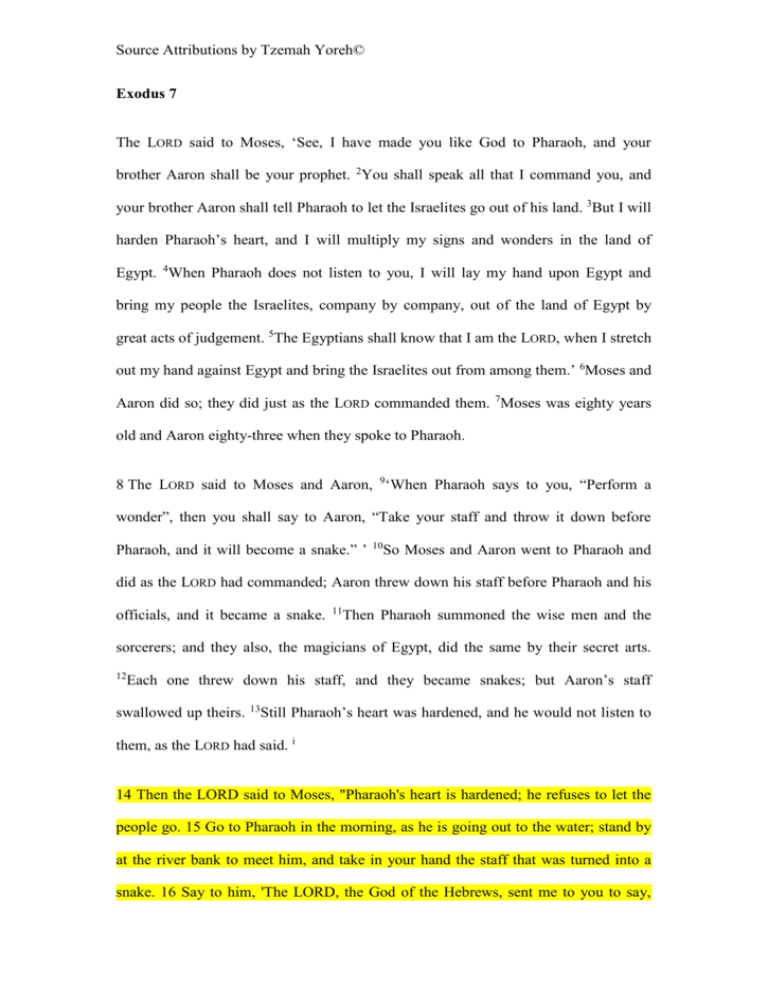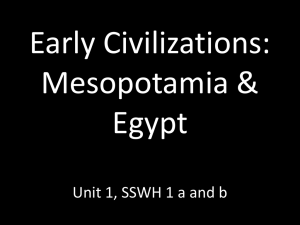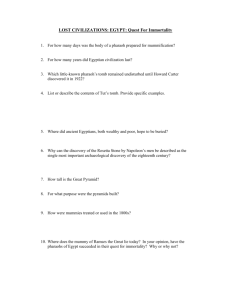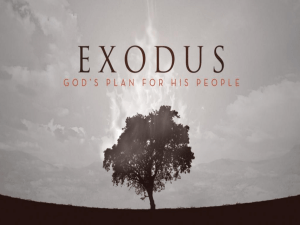Exodus 7 - biblecriticism
advertisement

Source Attributions by Tzemah Yoreh© Exodus 7 The LORD said to Moses, ‘See, I have made you like God to Pharaoh, and your brother Aaron shall be your prophet. 2You shall speak all that I command you, and your brother Aaron shall tell Pharaoh to let the Israelites go out of his land. 3But I will harden Pharaoh’s heart, and I will multiply my signs and wonders in the land of Egypt. 4When Pharaoh does not listen to you, I will lay my hand upon Egypt and bring my people the Israelites, company by company, out of the land of Egypt by great acts of judgement. 5The Egyptians shall know that I am the LORD, when I stretch out my hand against Egypt and bring the Israelites out from among them.’ 6Moses and Aaron did so; they did just as the LORD commanded them. 7Moses was eighty years old and Aaron eighty-three when they spoke to Pharaoh. 8 The LORD said to Moses and Aaron, 9‘When Pharaoh says to you, “Perform a wonder”, then you shall say to Aaron, “Take your staff and throw it down before Pharaoh, and it will become a snake.” ’ 10 So Moses and Aaron went to Pharaoh and did as the LORD had commanded; Aaron threw down his staff before Pharaoh and his officials, and it became a snake. 11 Then Pharaoh summoned the wise men and the sorcerers; and they also, the magicians of Egypt, did the same by their secret arts. 12 Each one threw down his staff, and they became snakes; but Aaron’s staff swallowed up theirs. 13Still Pharaoh’s heart was hardened, and he would not listen to them, as the LORD had said. i 14 Then the LORD said to Moses, "Pharaoh's heart is hardened; he refuses to let the people go. 15 Go to Pharaoh in the morning, as he is going out to the water; stand by at the river bank to meet him, and take in your hand the staff that was turned into a snake. 16 Say to him, 'The LORD, the God of the Hebrews, sent me to you to say, Source Attributions by Tzemah Yoreh© "Let my people go, so that they may worship me in the wilderness." But until now you have not listened.' 17 Thus says the LORD, "By this you shall know that I am the LORD." See, with the staff that is in my hand I will strike the water that is in the Nile, and it shall be turned to blood. 18 The fish in the river shall die, the river itself shall stink, and the Egyptians shall be unable to drink water from the Nile.'"ii 19 The LORD said to Moses, ‘Say to Aaron, “Take your staff and stretch out your hand over the waters of Egypt—over its rivers, its canals, and its ponds, and all its pools of water—so that they may become blood; and there shall be blood throughout the whole land of Egypt, even in vessels of wood and in vessels of stone.” ’ 20 Moses and Aaron did just as the LORD commanded.iii He lifted up the staff and struck the water in the river, and all the water in the river was turned into blood, 21 and the fish in the river died. The river stank so that the Egyptians could not drink its water, and there was blood throughout the whole land of Egypt.iv 22 But the magicians of Egypt did the same by their secret arts; so Pharaoh’s heart remained hardened, and he would not listen to them, as the LORD had said.v 23 Pharaoh turned and went into his house, and he did not take even this to heart. 24 And all the Egyptians had to dig along the Nile for water to drink, for they could not drink the water of the river. 25 Seven days passed after the LORD had struck the Nile.vi i The first of the Priestly signs (the others being lice and boils) which are added to J's seven plagues for a total of ten. The priestly signs are described as a contest between Source Attributions by Tzemah Yoreh© Aaron / Moses and Pharaoh's magicians which Aaron and Moses win. Note the use of the root ( חזקto harden) to describe the hardening of Pharaoh's heart, as opposed to J's כבד. ii J adds four plagues (blood, frogs, flies, and pestilence) to E's three (hail, locusts and darkness) for a total of seven. J's plagues (and the material he adds to E's plagues) are characterized by negotiation with Pharoah, repeated prophetic warnings quoting the God of the Hebrews, the hardening Pharoah's heart (in P – the Lord hardens Pharaoh's heat), and the Lord's ultimate responsibility for the plagues, emphasizing His greatness. iii P adds the divine command to perform the plague and Aaron's compliance – this type of command and compliance sequence is common throughout P, and compare the multiple times this phrase (and x did just as the Lord commanded) appears when the tabernacle is erected in Exodus 39-40. iv In J the antecedent of "He lifted up the staff" is Moses (vs. 17), whereas in P its Aaron (vs. 19). v The competition between the magicians and Aaron / Moses is characteristic of the P signs as in 7:11. vi The Lord is described here as performing the plague: " Seven days passed after the LORD had struck the Nile" (vs. 25), Moses is the Lord's vessel according to J as we find in vs. 17 "Thus says the LORD, "By this you shall know that I am the LORD." See, with the staff that is in my hand I will strike the water that is in the Nile, and it shall be turned to blood" as Aaron performance of the plague in vs. 19 (P). opposed to








